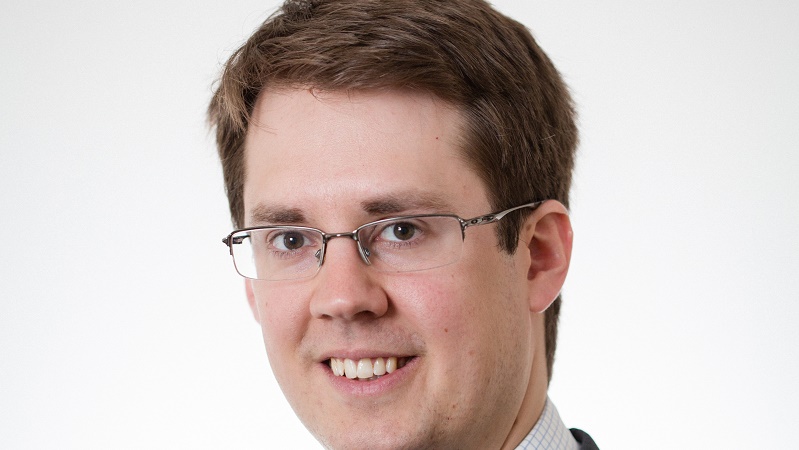Tom Yeowart is nervous about cranked-up levels of corporate leverage and rich equity valuations as quantitative tightening takes hold, so he has dialled down the risk in his Troy Asset Management Spectrum Fund.
And while he follows macroeconomic factors, Yeowart (pictured) says his role is not to play games trying to predict global events. His focus remains squarely on picking the best managers for his £118m fund of funds. This means the bulk of his time is spent choosing managers he believes will outperform over the market cycle.
“To me, it’s about finding the right people and giving them a long pathway for producing exceptional returns,” he explains. “And having faith in them to do that over the long term, rather than having a macro view of the world and deciding I should be in a fund at a particular point in time.”
Funds that fit the mould are unsurprisingly in the portfolio’s top holdings. Egerton Capital Equity, Findlay Park American and Polar Capital Global Insurance make up the top three at 7.6%, 7.6% and 6.3% respectively. Other more familiar names in the top 10 include Evenlode Income (5.1%), Lindsell Train Global Equity (5%) and Stewart Asia Pacific (4.9%).
About 70% of the portfolio is allocated to long-only equity funds and 30% to “diversifying assets”. However, amid the current volatile market, the equity allocation has dropped 2-3% over recent months while diversifying assets has crept up.
“There are going to be times when we believe equity valuations are more expensive and we think it’s sensible to reduce some of that equity risk,” he says. “We don’t want to be going pedal firmly to the floor, we think now is a time to be selective and discerning.”

End of an era
Among the so-called diversifying assets is a 15% weighting to cash, which Yeowart says is because of a high cash holding in a lot of the underlying funds, such as Findlay Park American and Yacktman US Equity. It also includes US inflation-linked bonds (CG Dollar and CG Real Return), gold bullion securities and two macro investment trusts, BH Macro and BH Global.
The reason for holding the macro trusts, which Yeowart added to the portfolio in February 2018, is the move from an era of quantitative easing to one of quantitative tightening and the potential for higher volatility as a result.
Yeowart says the fund fell just over 3% last year, which was disappointing from an absolute sense, but okay relative to the IA peer group. The Spectrum Fund has returned -0.28%, 36.15% and 50.85% over one, three and five years respectively, versus the IA Flexible Investment sector’s -3.75%, 26.49% and 33.69%. The fund is top quartile over one, three and five years, according to FE Analytics data.
Yeowart believes leaning too heavily on macro factors could lead to selling an exceptional fund and not getting back into it. This, coupled with his long-term viewpoint, means there is very little turnover in the fund with positions being trimmed or added to based on underlying valuations. Portfolio turnover in the Spectrum Fund was slightly higher last year than usual at 10.01%, compared with 3.28% in 2017 and 1.95% in 2016.
Keep the faith
Low turnover comes from having conviction in the managers that Yeowart says takes a long time to develop. In fact, he meets hundreds of managers a year often for a third, fourth or fifth time if they are deemed a worthy portfolio candidate.
“It’s very hard to sit in front of a fund manager for the first time and hear them pitch their fund and really have the conviction to buy it straightaway,” he says. “I think you find out a manager’s strengths and weaknesses from following a fund over time.”
Yeowart has a list of five to 10 funds that could conceivably make it into the portfolio’s 23 holdings, but he has not built enough conviction that any of these are better than the existing names to enter the fold.
To avoid focusing on a manager’s short-term performance, he looks through to the individual managers’ underlying holdings on a monthly basis to see how the underlying fundamentals are changing.
He explains: “Often if a manager is going through a weak period of performance and you see great value emerging in the underlying constituents of the fund, you’re more inclined to top up the holding if you have conviction in the manager.”
Topping up
The market sell-off in Q4 of last year was a chance for Yeowart to sharpen his focus on the managers he has conviction in, which led him to top up two main areas.
First, he added to the holding in the Phoenix Asset Management-run Aurora Investment Trust after it experienced a weak period in the second half of last year, particularly in December when the share price dropped to 182p from its high of about 218p. Yeowart has held the trust, which has a concentrated portfolio of about 16 names, since January 2016 when Phoenix was appointed by the directors to run the portfolio. It is now 3.8% of the Spectrum Fund.
Another position Yeowart has added to recently is Hal Trust, an investment trust holding company. He likes this because it is majority family-owned and has a strong 30-year track record of creating value for shareholders.
Also, he says the company does not have the same pressures as a fund manager in terms of reporting performance on a monthly basis and worrying about benchmarks. Hal Trust now represents 3.5% of the portfolio.
Yeowart says there is scope for these two holdings to become larger weights in the portfolio but he stresses they will never have a similar weight to Findlay Park or Egerton Capital because of liquidity issues (Spectrum is a daily-dealing fund).
Another holding, Samarang Asian Prosperity (4.7%), has been a long-term holding in the portfolio and one that Yeowart has added to incrementally. He bought more in Q4 last year after the fund suffered a “meaningful sell-off” and Yeowart deemed valuations to be as attractive as they had been since the fund launched in 2012. He also likes that the fund is closed to new investors.

Home territory
Yeowart describes Spectrum as a globally-diversified fund but he is agnostic towards geographical weighting, reinforcing the point that his style is bottom-up and about finding the best managers.
Valuations play a part, however, and he believes the US remains highly valued. At portfolio level, the weighting to US equities is 12%, but looking through to the underlying managers’ holdings, this jumps to 24%. Yeowart says this allocation has the scope to increase as there are some small-cap funds on his watchlist, but his concern over valuations is holding him back from introducing them to the portfolio.
On the other hand, the UK has been depressed and the weighting in the portfolio has crept up on account of this, hence the increase in the Aurora trust.
Despite bumping up exposure to the Samarang fund, exposure to Asia and emerging markets remains relatively low. Asia Pacific ex Japan accounts for about 8% while emerging markets is just shy of 4%.
“Even though those markets are optically cheaper if you look at the price to earnings, price to book etc, I think that if we see any significant sell-off in the US or developed markets in general, you would see some liquidity drain out of these markets.”
He adds: “I think the portfolio reflects the fact that the US is arguably the highest quality segment, it’s probably got the broadest, deepest pool of good quality businesses, but it’s a lot more expensive. Whereas in Asia and emerging markets you have to be far more selective, but it looks cheaper.”
Backing boutiques
Yeowart has a penchant for boutique managers, preferring the structure compared with larger, better-known listed names.
“The boutiques among Spectrum’s holdings tend to focus on doing one thing and doing it really well,” he says.
Taking Findlay Park American as an example, he says the fund has been in existence for more than 20 years, with a team that is focused purely on one fund that is closed to new client capital, showing capacity discipline.
“You’re allocating to people who you know are aligned with you and are focused on doing one thing really well,” he says.
Just how important is capacity control to Yeowart? “It’s very important to me,” he says. “It reflects the culture and ethos of an organisation and I’m aiming to align myself with boutiques that first and foremost, are concentrating on performance rather than gathering assets.
“You won’t see their name on the side of a taxi or in the tube station, they get on with the job of managing money.”
Does this approach to capacity apply to his own fund? At £118m Yeowart believes Spectrum has scope to grow, but there is a size at which liquidity becomes a consideration when investing in smaller funds.
“It’s fair to say once you get into the billions, you start to become pretty constrained in terms of owning the likes of the Aurora Investment Trust,” he says. “I want to be able to allocate to who I consider to be the best fund managers whether they’re managing £100m or £5bn.”







